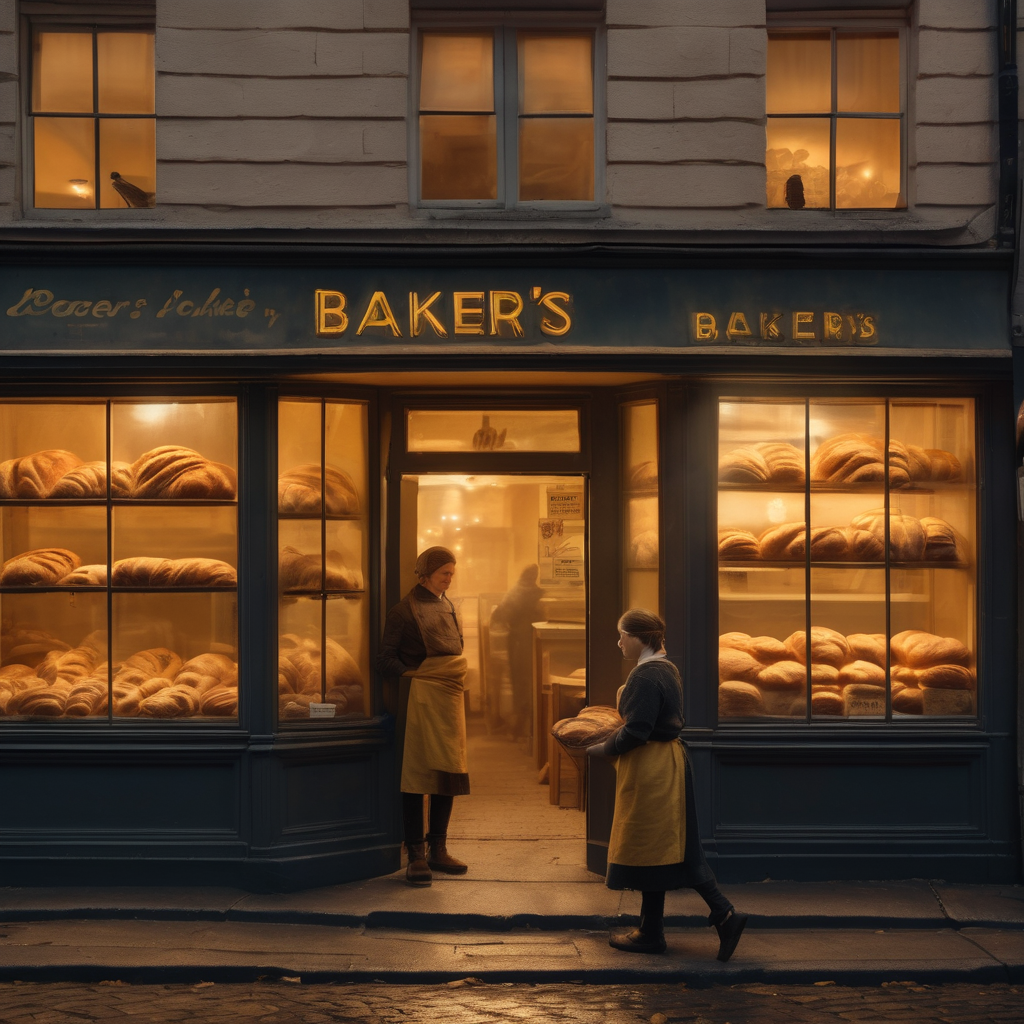The bakery window stretched like a portal between worlds, its glass fogged with the breath of passersby who pressed their faces against it, yearning. Behind the transparent barrier, golden croissants sat plump and perfect, their buttery shells catching the amber light of late afternoon.
Maya had been standing there for seventeen minutes. She knew because the church bells had chimed twice since she’d stopped walking, her worn boots rooted to the cobblestones as if the earth itself conspired to keep her in place. Her stomach cramped with the familiar ache of emptiness, but it wasn’t just hunger that held her captive.
Through the glass, she watched the baker’s daughter arrange fresh loaves on wooden shelves. The girl moved with the fluid grace of someone who had never known want, never calculated the weight of coins against the weight of bread. Her hands were soft, unmarked by the calluses that mapped Maya’s own palms like a geography of struggle.
A gentleman in a velvet coat emerged from the shop, a paper bag tucked under his arm like treasure. The scent of warm yeast and cinnamon escaped with him, curling around Maya’s senses before dissolving into the autumn air. She closed her eyes and tried to taste it, to fill the hollow spaces inside her with imagination alone.
When she opened them again, the baker’s daughter was watching her through the window. Their eyes met across the divide of glass and circumstance, two young women separated by birth and fortune yet connected by something Maya couldn’t name. The girl’s expression wasn’t pity—Maya had seen enough of that to recognize it instantly. Instead, there was a curious hunger in her gaze, as if she were the one standing outside looking in.
The girl raised her hand to the glass, fingers splayed against the barrier. After a moment’s hesitation, Maya mirrored the gesture, their palms almost touching through the transparent wall. The glass was cold beneath Maya’s fingertips, solid and unforgiving, yet somehow it felt as thin as gossamer.
In that moment, Maya understood that hunger wore many faces. Her own was carved from want and scarcity, each meal a small victory against an indifferent world. But the girl’s hunger was different—a yearning for something that couldn’t be bought or baked or wrapped in paper. It was the hunger for a life beyond the warm safety of her father’s shop, for adventures that left calluses on your hands and stories etched in the lines of your face.
The baker appeared behind his daughter, his flour-dusted apron a badge of honest labor. He glanced at Maya through the window, then at his daughter’s outstretched hand, and something shifted in his weathered features. Without a word, he wrapped a still-warm loaf in brown paper and handed it to the girl.
She disappeared from view, and moments later the shop door chimed open. The baker’s daughter stepped onto the cobblestones, the wrapped bread cradled in her arms like an offering.
“I see you here sometimes,” she said softly, extending the loaf toward Maya. “I watch from inside and wonder what it would be like to walk away from here, to not know where my next meal might come from.”
Maya accepted the bread, its warmth seeping through the paper into her cold hands. “And I wonder what it would be like to never worry about it at all.”
They stood together in the fading light, the glass window reflecting their paired silhouettes back at them. Two kinds of hunger, Maya thought, could perhaps feed each other in ways that bread alone never could.
“I’m Elena,” the girl said.
“Maya.” She tore the loaf in half and offered a piece back to Elena. “Share it with me?”
Elena’s smile was radiant as she accepted the bread—not because she needed it, but because for the first time in her sheltered life, she was eating something earned through connection rather than given through circumstance.
As the first stars appeared overhead, they sat together on the bakery steps, sharing more than bread. They exchanged stories, dreams, and the kind of hunger that could only be satisfied by truly seeing another person across whatever glass divided them.
The window behind them gleamed empty now, its display cleared for the night. But the barrier it represented had begun to crack, one shared meal at a time.

Leave a Reply